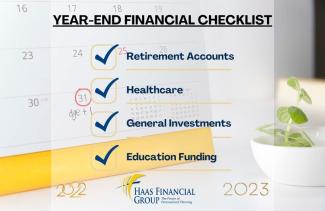
Year-End Financial Checklist
As we rapidly head towards the end of 2022, here’s some financial tips to consider before December 31st rolls around.
Retirement accounts:
- Consider maxing out your employer plans if you have excess cash to contribute. This is a great way to lower your taxable income if you’re putting money in pre-tax investments
- Max 401(k), 403(b) contributions: $20,500 and there is a catch-up provision for anyone over the age of 50 of $6,500 (total of $27k)
- Max IRA contributions: $6,000 with a catch-up provision for anyone over the age of 50 of $1,000 (total of $7k)
- NOTE: you can contribute for 2022 in 2023, up until tax filing time (April 18th)
- Consider executing a Roth conversion is you aren’t showing a lot of taxable income. This will incur some taxes and show it as income, but moving it to a Roth IRA means that it will never be taxed again! You're able to control how much you convert while remaining in a tax rate that is comfortable to you. If you like this idea, find more details here.
- If you’re over the age of 72, be sure to take your RMD (required minimum distribution)! We can’t stress this one enough as we don’t want anyone to incur penalties by not taking out what they’re supposed to.
Healthcare:
- Use your balance in your FSA (flexible savings account) before the end of the year as you will lose it come January 1, 2023.
- Consider maxing out your HSA (health savings account)
- Single person contribution: $3,650
- Family contribution: $7,300
- Catch-up contribution for people age 55+: $1,000
- If you’re close to reaching your deductible, consider scheduling any medical appointments or procedures so you can minimize your out-of-pocket spending
General investments:
- Tax loss harvesting – you could sell an investment that’s underperforming and incurring losses within your portfolio. This will allow you to offset any taxable capital gains that you may have for the year. You’ll be able to have a loss of $3k on your tax return to offset your income and any losses above that amount can be carried forward.
- Listen to Ben and Adam talk more in depth about this topic here!
- Consider reviewing all beneficiaries listed on your accounts and life insurance to reflect your wishes in the case of a premature passing
Education Funding:
- The max contribution to 529 plans and ABLE accounts is $16k/individual. Consider fully contributing if you have excess cash for your child/grandchild
- If they have earned income, you can also consider opening a Roth IRA in your loved one’s name and contributing on their behalf (up to $6k) but it must not be higher than how much they made in this year
- Example: if your grandchild made $4k, you would be able to contribute that amount to a Roth IRA
Tracking # T004778
Investment Advice offered through Great Valley Advisor Group, a Registered Investment Advisor. Great Valley Advisor Group and Haas Financial Group are separate entities. This is not intended to be used as tax or legal advice. Please consult a tax or legal professional for specific information and advice.

